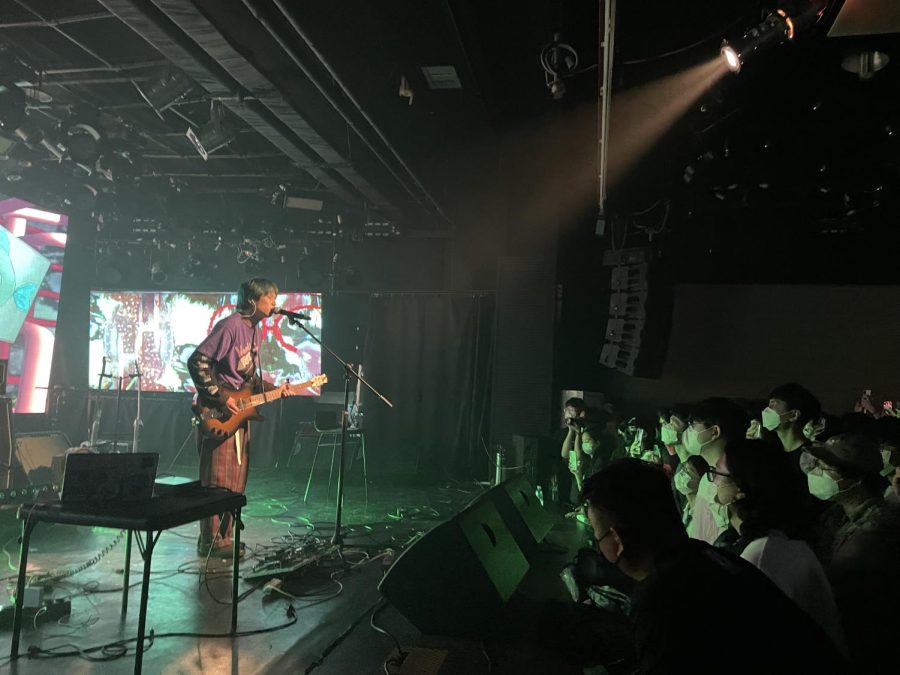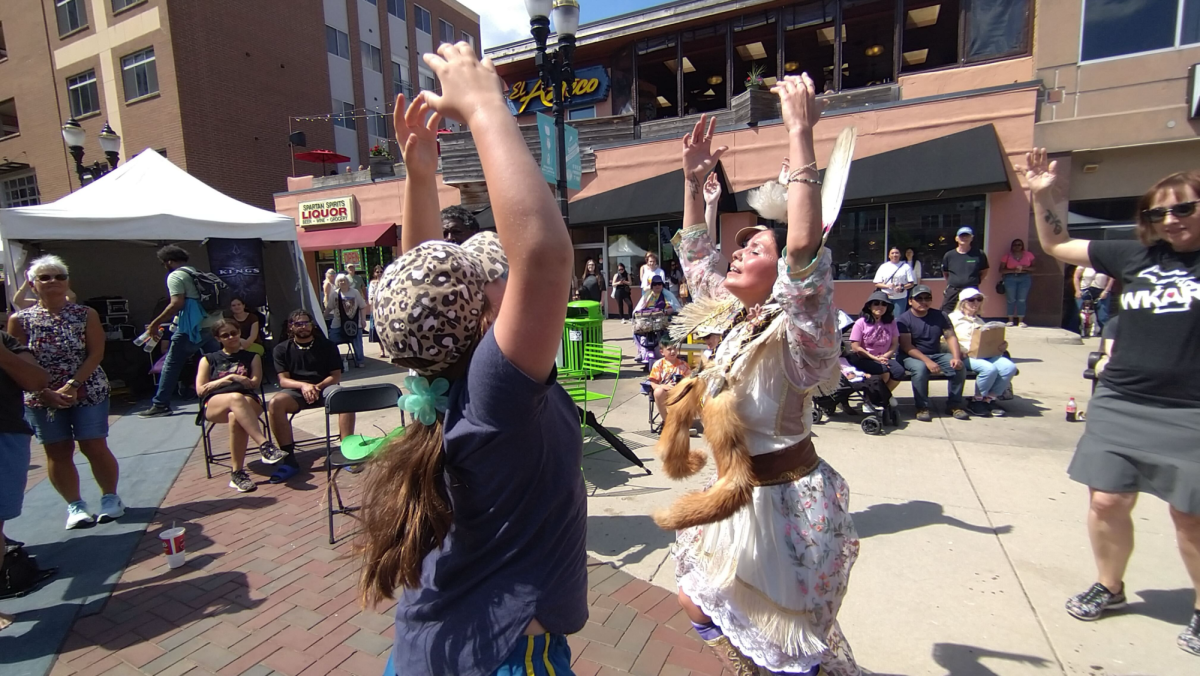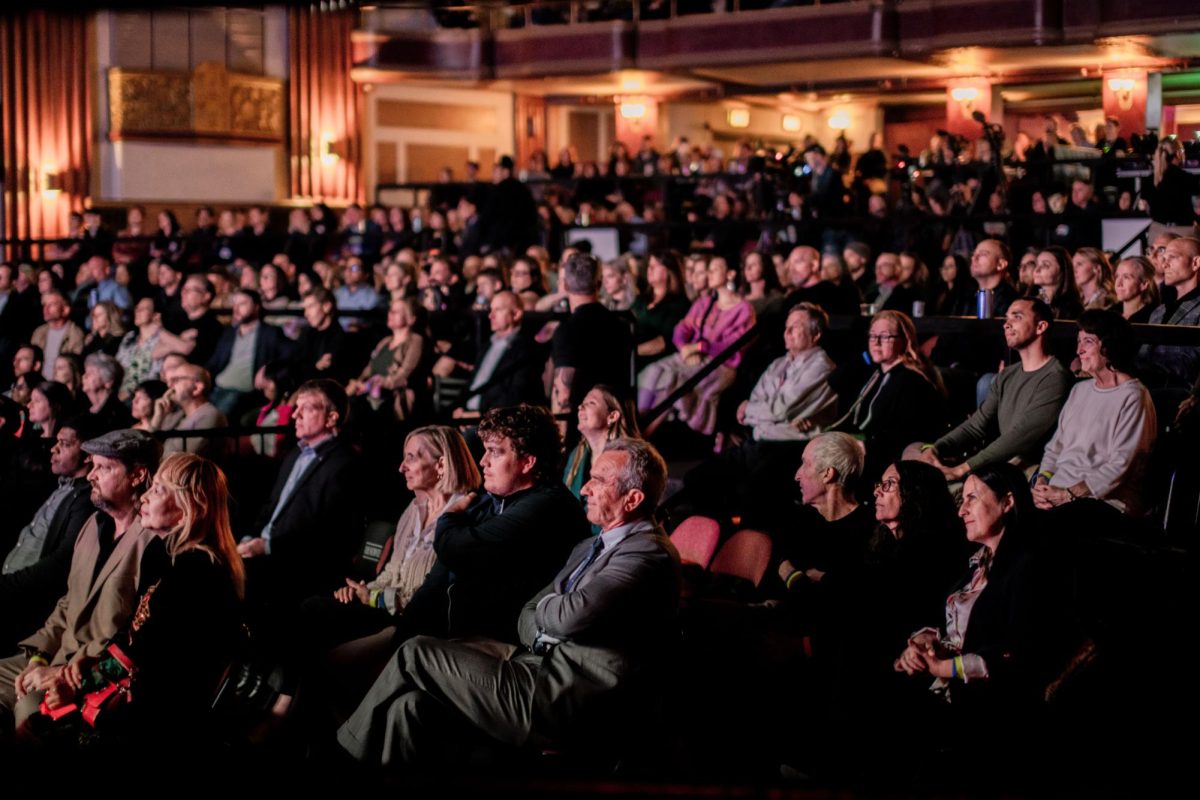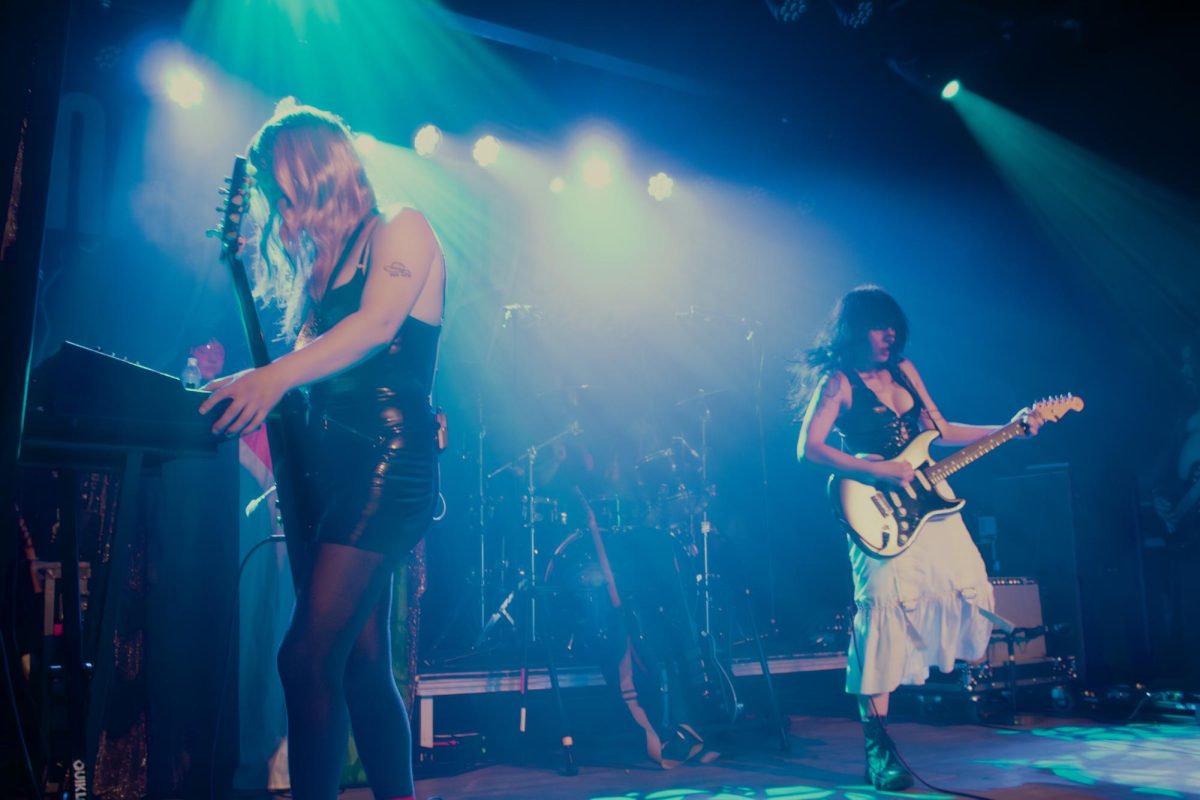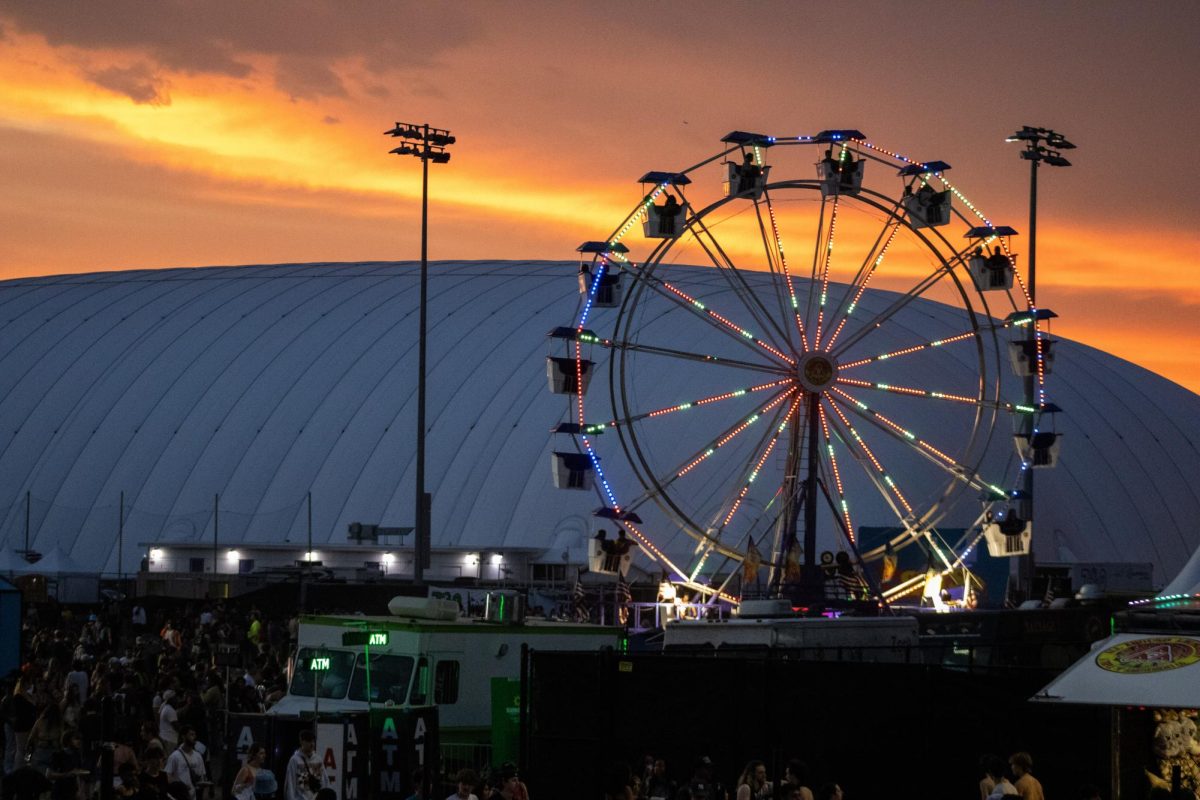The Dawn of a New Era: Seoul’s Best and Brightest | Parannoul, Asian Glow, BrokenTeeth, Wapddi, Della Zyr & Fin Fior @ Rolling Hall
September 16, 2022
August 14th is a historic day for all music fans across the world.
Chances are if you’re familiar with the current Korean zeitgeist, you might recoil or rejoice at the thought of another K-pop outfit being exported for the American masses yet again. However, the emblematic quality of Digital Dawn as a benchmark for independent music is that it was the first de facto gathering of a generation of Seoul’s brightest artists. As cars careened across the boiling Seoul streets, and people went about their days, the musicians torch-bearing a new generation in the Korean underground were all but confirmed.
I was sitting with my friends in the green room of Rolling Hall, counting down the minutes before doors opened and a flood of music listeners were to pack the venue. Apparently, people had started lining up over two hours before doors opened to be the first ones in line. I climbed the stairs to see for myself if such a warm reception was as pathetic as it seemed — after which I ran screaming about the twin-tailed line completely surrounding the venue on this tiny plot of land. Hundreds of people all outside and waiting to be let in for their big moment.
While Korean music has largely been typecast as saccharin, artistically-bankrupt pop music by naysayers and boomers, Digital Dawn was the literal dawning of something completely new, something bubbling in the basements and apartments of the entire peninsula — everything from britpop-indie-rock, to art-rock, emo, dream pop and post-rock-inspired shoegaze. What exactly was the “Digital Dawn” that caused Rolling Hall to sell out in 30 seconds, and 350 attendees to completely stall a tiny Korean block in Mapo-Gu?
Parannoul,
Asian Glow,
Wapddi,
BrokenTeeth,
Della Zyr,
and Fin Fior.
6 of Seoul’s brightest artists, all headliners, for one night, standing-room only.
We were scrambling. We were shocked. We were confident. We were scared. The gravity of something so intense doesn’t hit you until it’s practically there. I was several time zones away at an event being held by people who, just until very recently, were “nobodies.” Nothing says love and admiration like lugging 100 pounds of merch for your friends through the oven that is mid-August Seoul. We weren’t sure what to expect, other than everything and nothing. Some of them were playing their very first show — to a voracious crowd nonetheless.
Fin Fior was trying to sleep in the back, jet lagged from a Paris flight, with a seemingly unending sea of people flooding the space as time dwindled to zero.
“I feel nothing,” another friend of mine said. Well, that’ll have to do.
It was soon 6:00 PM. I told everyone that they were going to kill it. It was finally starting. The sun was beginning to peek over the horizon. I felt warm in its yellow glow.
A thin white screen dropped down as the room went silent. A projector flashed and on it, we saw Fin Fior. A home video recorded by friends, explaining who they are — and in it — everyone else. The uniqueness of Digital Dawn is only half the star power of the musicians behind it; the other half is the genesis of their fame, and the meteoric rise to nothing but the zeitgeist of the Korean underground. Everyone knows everyone. This is not a collection of artists for mutual benefit, but a celebration of each other for their role in helping shape the lives of each and every one of them. One could not be possible without the other. Each person provided for another, an equal and opposite reaction that creates an impossible tension suspending the relationship of everyone and their music in an iron-forged harmony. DIY has always been about helping others out — but to have a successful, close-knit group of people far before either of them had succeeded is something not even The Scene That Celebrates Itself could boldly brandish on its lapel.
In this sense, they were not celebrating the scene, but the interactions between humans, and the relationships that make artistic spaces, movements and production possible.
A wave goodbye, and a thunderous roar. Fin Fior exploded on stage with a stage presence that would make Will Toledo re-write “Cute Thing.” You would think he was possessed by David Bowie the way that he effortlessly moved around the stage. You could hardly tell he was curled up on some chairs 30 feet to the left 15 minutes ago.
With a pick raised to the sky, Fin Fior channeled his energy through his guitar like an electric conduit. A stratocaster was surely a lightning rod, and it was nothing short of electrifying. “겁이나” shoots out at the listener like fireworks with its crunchy sound crumbling like flares from a Roman candle. Serenading vocals and an energetic riff blanket the listener in incandescent stardust.
An infectious hook wriggles its way into your ear canal:
“언젠가 여길 벗어날 수 있을까? /
나 혼자서이 길을 갈 수 있을까? /
귀신처럼 떠도는이 무력 함 /
난 겁이나”
“Can I get out of here someday? /
Can I go this route alone? /
This helplessness that wanders like a ghost /
I’m scared.”*
The dynamic and varied instrumentation is nothing short of sublime. Precocious synths glimmer beneath trackers and xylophones, and transform into a prismatic keyboard and saxophone passage. Fin Fior’s vocals never lose steam; each croon being projected with the passion of a true rock star, and an unwavering conviction.
An earthquake suddenly bellows from the subwoofers, glimmering chords strung from radio towers rattle the earth with their sway. Such is the ascension of “미세 먼지”. It vibrates your skeleton, and kisses the eardrums, with the spacious percussion and dripping keys staggering between the stride of the guitar.
“Is it going over my head? /
Is it falling over my head? /
조용히 네 곁을 감싸는 건 /
Is it going over my head? /
Is it falling over my head? /
조용히 네 곁에 내려”
Fin Fior is an exceptional artist whose art knows no bounds. One song, Korean indie rock. The next, synth-laden art rock. Another? Shoegaze-tinged guitars with a heft even Kevin Shields would find impressive. It is certainly one of the most dynamic sets I’ve ever seen, and he gave his all to put on an opening like no other. With each arm towards the sky, it truly feels as if Fin Fior is trying to touch the stars — and god damn he just might.
For each artist, the screen dropped with a video. A seamless transition that would introduce, and familiarize the listener with the next performer on the off chance they hadn’t been already. Wapddi, the organizer of the event, and the great unifier of Digital Dawn showcases his two greatest loves in life: music and his friends. The fun-loving guy who masterminds Wapddi perfectly showcases that across his music.
“찐따같은 나 (JJinDDa like ME)” is a joyous romp through exactly what makes Wapddi, Wapddi.
“Jjindda” – is a Korean slang term meaning “idiot” or “loser,” but looks can be deceiving; You can’t help but smile when the charging guitar riffs rush at lightspeed with the playful falsetto in the sidecar. A post punk revival, K-indie blast has your feet practically jumping autonomously.
“I want to be close to you.
I’m a nerd.
I’m just reading.
(I wanted to ask you if you like Star Wars.)
I want to be close to you.
I’m a nerd.
You’re just reading.”*
The entire crowd sang along in an excited roar. Like it or not, you couldn’t help but come alive with each occurring strum. The quick-paced song and delivery trample your brain with dopamine rush after dopamine rush — hardly a song made by a “jjindda” if you ask me.
It’s no secret that Wapddi has perfected bitpop, particularly with 2021’s excellent Jordan Wants to Play, and Wapddi seemed just as eager to show off that mastery as the titular character itself. Constructed completely out of granular guitars only comparable to “To All the Dancers of the World, A Round Form of Fantasy.”
“Tell the people in white /
that Jordan Wants to Play /
Tell the people in white /
that Jordan Wants to Play.”
Pop perfection stimulates the brain like no other on “Jordan Wants to Play.” The cymbals seemingly lose their physicality, fading into pixels against the flourishing guitar. The live setting is treating Wapddi exceptionally, with delay arpeggiating the guitar closer to the borders of dream pop, but enough to retain the nostalgia and serrated nature inherent in bitpop.
“The daily life of a rockstar,” said our friend James, strolling the Seoul nightscape with Della Zyr. With nothing but sunbeams cutting through the darkness on stage, she stood conversing with the microphone; a silhouette. The lush and meditative keys that hopscotch the dreamscape of “기다려준 새벽 (Following Her to No Particular Sunrise)” become strewn over the listener like a summer breeze racing through your hair. The live setting forcibly stripped the song’s usual acoustic textures for a more angular, rock sound.
Her eyes were shut; her body almost cradled in the wall of sound she crafted before your very eyes.
“Her hand outstretched, a nod, she beckons, /
I know it’s not for me.”
With each strum and each verse, Della Zyr commanded all the attention to her dream pop ribboning off her fingertips, and onto the floor, oozing into the crowd below. While the track normally exudes a soft, reflective acoustic portion, the walls of sound come alive completely when fully electric.
Her set shed the skin of familiarity to reveal something new: an 11-minute transformational epic featuring backing vocals from Parannoul, “모호함 속의 너 / 2악장 / 놓아줄 때가 되면 놓아주기”.
Each strum from her guitar filled the room with iridescent bubbles, affixing themselves to every surface before popping; raining down in a vibrant mist. The colorful guitarwork dazzled like sequins, and projected colors into the room that could hardly be perceived with the human eye. From one part to the next, the track wove into a seamless needlepoint of sound: an arpeggiating masterpiece.
Gone is the warm, homespun sound of compression that her last record adorned like crown jewels. What unravels before your very eyes is a more nuanced understanding of mixing, songwriting, and production. Each layer is quivering like a flag above the listener; harmonious, yet distinguished in a proud dance on the ceiling. My jaw dropped, and I let her endless blankets consume me as if bracing for winter.
Last I heard, Slowdive is scrambling for how to follow up the song.
In a natural fit, Della finished her setlist with the closer off of her record, Vitamins and Apprehension “나의 미래 (So Please Don’t Leave Me) / 한숨 / To Go Forward Despite the Terror of Living in This World, Clinging to a Tiny Speck of Hope”. The wistful balladry swelled until it was bursting at the seams — before raining down the entire crowd with an emotive drizzle — a signal of better weather to come. The lyrical themes of the song captivated the audience, both a salute to pain gone by, and the first step in a journey that ultimately led her to this very day.
“So for now, I’ll just start with one step forward /
(한숨) /
Just for now, let me be held /
Until the sun dips below the crashing waves.”
A trend you might’ve been able to notice is the energy of Fin Fior simmering from a boiling temperament, to increasingly more spacious and luxurious sets. BrokenTeeth is perhaps the most outright “shoegaze” of the six, but don’t let his infatuation with stunning atmosphere fool you into thinking it is weightless. The brief reprieve allows the audience to rest before the final two sets. BrokenTeeth has seemingly mastered the spectrum of shoegazing, dual wielding the delicate balancing act between gliding ambience and heavy walls of sound.
A single pluck of his guitar draws all the air out the room.
“나는 밤새 불을 피웠지 /
잊지 못한 것들에 /
잊을 수 없던 것들에 /
나는 밤새 불을 피웠지”
“I lit a fire all night. /
Unforgettable things /
Unforgettable things /
I started a fire all night.”*
BrokenTeeth’s gargantuan walls of sound eclipse the height of Lotte World Tower, merely a thumbtack in comparison. The sound waves bounce off the walls in waves creating a more lush, full, and complete sound than even on the digital recordings. It caresses every part of you, and swaddles you in its warmth.
The wall of sound gives, parting momentarily for his rich voice, before drowning you again.
A familiar face takes the stage: Della Zyr comes out to do a duet with BrokenTeeth. The two share a kindred understanding of atmosphere, and make for one of the most sublime performances of the entire evening. “Heaven Express” is as apt a title as one could hope for; it is rapturous in every sense of the word.
Opening with the piercing percussion, BrokenTeeth serves to build his world around its pinholes. This is anything but a bottleneck, and serves to puncture the luxurious wall of sound, beneath disembodied voices and his harmonizing with Della Zyr’s vocals. Head above water, I am floating, my body lit in the sunlight. Suspended in animation, I am in pure bliss. Both myself and the song are the poster child for the “dream” of dream pop. Please don’t wake me up.
Still reeling from the heavy flood of sound, that’s enough rest for tonight. Time to take to my feet.
Preceding the last act is Asian Glow, the lo-fi noise pop wunderkind continually making waves on the internet. The most traditionally “emo” act, noise and angular texture is a benchmark of his style; mixing influences from as far as The Microphones to My Bloody Valentine. Asian Glow decides to open his act with the nine-minute epic from his latest album, Stalled Flutes, means — “Look Close, Nose The Reflection”
Crystalized bells replace the synths during the song’s opening moments. Like many recent Asian Glow songs, “Look Close…” is a grand machine-scape composed of interlocking, tiny moving parts. The complexity of the songs on Stalled Flutes necessitate a more minimal palette when being performed live, leading to a more punk-reminiscent, guitar-driven edge; however, do not be foolish enough to presume among the forgone elements that catharsis was among them.
“Cause he rather be alone /
No one has to be stay same /
If he stayed awake /
Who know that he’d hurt someone /
He loves more than anyone he ever be with.”
“5:21:2000” retains the fervent bite of the Cull Ficle original, if not MORE despondent and panicked. Any perceived shortcomings are completely washed away by the visceral, heartfelt performance. The final verse sounds in character: completely empty, and emotionally gripping.
“Would you know I’d be despair? Would you know I’d kill you? /
Is it that hard to say sorry? Is it that hard to say sorry?”
Asian Glow screamed the final verses of the song; a powerful relinquishment that dwarfs any recording in his studio library. In other words: complete and utter spiritual release. Squint and you can almost see the pain in his exhale.
The final song in Asian Glow’s set was the one that started it all: Cull Ficle’s opening track, “Circumstances Telling Me Who I Am”.
“Stuck in a chamber room, voices echoing all around the places /
Hoping to find exit that doesn’t exist /
And circumstances keep telling me who I am /
All the circumstances beat all my dreams to stand.”
The guitar and anxious screams bubble atop the instrumental, completely transcending the song’s life performance into a performance art that is pure expulsion. Each song is so delicately woven together and so furiously performed you might think it’s in danger of collapsing in on itself from its projected energy, but soon you realize Asian Glow is the supporting structure themselves.
“감사합니다”
Look to the stage; He’s given everything he’s had, almost collapsed in exhaustion.
A steel spire pokes out from the left of the screen beneath unmistakable halogen lighting. An IV drip is coiled around and out of view, disappearing beyond the frame and into the unknown. Parannoul has his video taken from a hospital room. While the other videos show clips of dinners, with friends and of each other, Parannoul’s video does not. This is not something he needs to say; it is a given known to those close to him. Parannoul’s video reflects something more controlled and personal — the crux of his sound that his music is never short of containing. The screen lifts, and against a flowing background of watercolor stands a Korean man with nothing but a keyboard.
This man, who seemingly, along with everyone else, is going to inspire a generation of music listeners. Standing in front of them is the person who made arguably the most famous shoegaze album since Velocity : Design : Comfort, the critically-acclaimed and fan-favorite To See the Next Part of the Dream.
What greeted the listener was sonically alien, yet completely familiar. The lo-fi veil that Parannoul’s fanbase had wrapped him within had been completely shed, revealing a much more mature, atmospheric, and developed sound than what made him popular.
“Blossom,” poignancy at its finest. The synth lead seemed to drag his voice in a soothing rhythm. The wall of sound no longer obscures his voice. However, Parannoul didn’t quite give it the wrecking ball you would assume. The sine wave presents itself differently here; part of a greater whole, a commonality that brings each piece together rather than a mask that hides away. The balance between ambience, instrumental, and noise completely usurped any preconceived notion about Parannoul’s previous work.
He displays an alarming self-awareness to the core texture of his sound, bringing with these new compositions a chimeric modality to them. It is leaps and bounds ahead of the lo-fi masterwork we’re familiar with — and is leaps and bounds more Parannoul as a result.
I can see it with my own two eyes and ears. Right here, right now — this is the Parannoul that was always meant to be.
In a blue flash, his watercolor soundscape turns to a familiar ultramarine. Gone was the brush-stroked video, and on the screen was the art to his sophomore record in its iconic glory. He had pulled a bait and switch — alleging to not perform any material from his breakout album at the show — but fans were in for a treat during the final number.
With candied synths and a deafening wave of noise, “Analog Sentimentalism” was energetically unsheathed with a leveling force strong enough to buckle the sidewalks some 30 feet above.
The entire crowd erupted in an ecstatic uproar. Their expectations completely dissolved with what was essentially sonic contraband. Every single word was sung by every person in the crowd. Line by line, everything was spoken with a pinpoint precision. With the complete 350-sum people in attendance shouting back; It was as much a concert for Parannoul as it was for the fans.
“그날 다같이 보았던 영화 당신은 지금 기억하나요 /
필름카메라에 담겨진 행복했을때의 우리들 /
일상속에 녹아들어간 아날로그 센티멘탈리즘”
“Do you remember the movie we watched together that day? /
Our happy moments on film camera /
Analog sentimentalism in everyday life”
However, to truly make this a show-stopping finale, the song began to unfurl into a medley of both “Colors” and “White Ceiling.”
“Release My Color,” he sings.
The bass and the cymbals began to crash against each other; you lift to the clouds and you’re adrift amongst explosions in the sky. Pure projectiles of color race before your very eyes. The soundscape is so delicately woven, it’s perfectly audible yet on the brink of causing the studio speakers to clip. An artillery fire of rhythm showcases the skeleton of the track; the concatenated beat pattern of “Colors,” with the sisyphean strum of “White Ceiling” and its emotional exhaustion.
Before he took the stage, I could see his leg shaking and stare — blank. But throughout the set, he loosened up after each song — daring to be more and more adventurous with his stage presence. “Analog Sentimentalism / Colors / White Ceiling” has all but proved that, with Parannoul lifting his keyboard off the stand to almost join in harmony with the music itself.
He’s finally surrendered himself to the music.
He smiled, finally seeing the first chunk of “The Next Part”.
At long last, it was over. All the anxiety had melted away into a sense of complete wonder. The lights returned, and all six musicians got on stage for their overdue ovation. After tiny speeches and a group folder, The Digital Dawn crew got on stage, thanked every single person for coming, and bid all a good night.
It was 11 o’clock in Mapo-Gu. The moon was out, and it was still warm. All 350 people exited Rolling Hall, changed forever. An immense achievement through and through for all who attended, planned and performed.
At nothing short of gushing… was this perhaps the greatest show in the world? Well, to the average listener, probably not. However, the average listener does not have the relationship that I do with Digital Dawn; its genesis, meaning and above all its people But more importantly, Digital Dawn represents something beyond just objective musical quality: It represents the complete subversion of the Korean pop scene at large, and the legitimization of public interest at large in domestic independent acts. Seeing people I genuinely love go from unknown faces I emailed, to respected independent artists, to artists at the forefront of their genres in the span of a year and a half is an immense privilege that is an unforgettable, life-defining experience.
This is the single greatest concert I will ever experience due to that fact.
While the language in this piece suggests a fresh sound on the horizon, a dawning per se, in truth, the sun in the sky was already overhead; Digital Dawn was merely the ribbon-cutting to the flourishing days ahead for themselves and many more. It will always be the “first show” for several trailblazing acts who will only continue to define the modern zeitgeist, a show that will prove to others that their dreams are possible.
It’s often a stereotype among music listeners to talk about legendary shows that they wish they could’ve been alive for or gone to: “Where were you when the Sex Pistols played at St. Martins?” or “Where were you when Joy Division [Warsaw] played Pips Disco?” or “Where were you when Fishmans played Akasaka Blitz?”
“Where were you when Parannoul and the Digital Dawn crew played Rolling Hall?” As James Murphy put it best — I was there.
*Translations are approximate and may not be definitive


